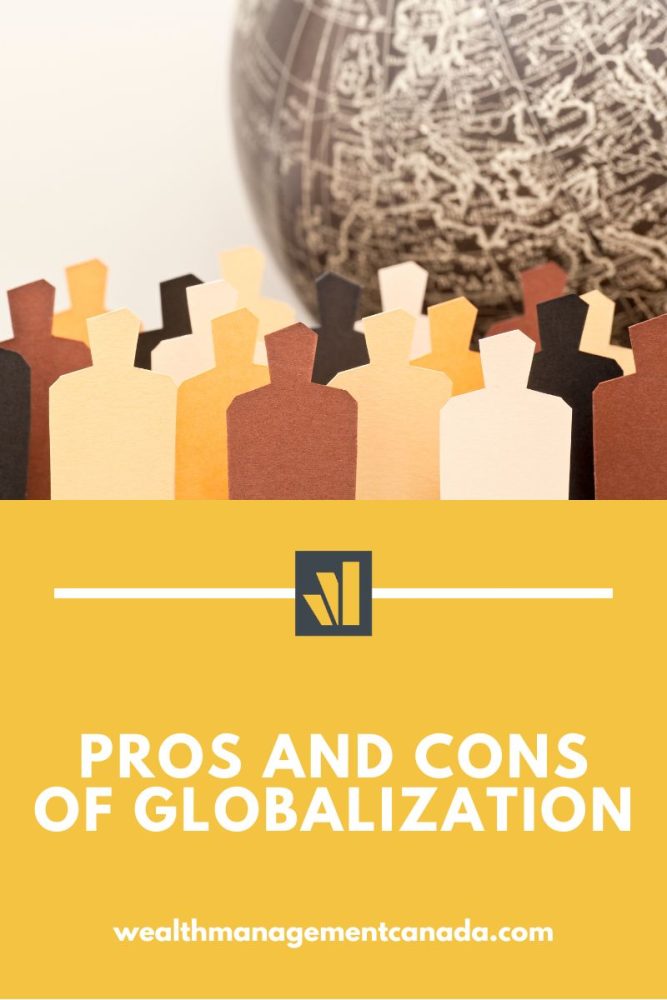Going shopping? You have tons of options, from modestly priced clothing to high-end, local artisan accessories. You can thank globalization for the array of choices, since it fuels international trade and imports. Indeed, globalization can connect people, countries, cultures, and economies, but it comes with concerns like local job loss and diluted sovereignty. So, what are the pros and cons of globalization, and how does it impact your finances? If you have concerns, your best bet is to chat with a wealth manager, but we’ll walk you through the pros and cons for easy reference in this article.

Table of contents
What is globalization?
Britannica’s definition of globalization is the “stretching of economic, political, and social relationships in space and time.” What does that “stretching” actually entail?
For starters, economic might refer to ease of business. Free, globalized trade allows businesses to purchase products in one country, manufacture them in another, and sell them at home, here in Canada.
On top of that, political globalization merges policies and laws across borders. Entities like the United Nations (UN) advocate for international standards of peace, human rights, and security.
As for social “stretching”, this may be the most convoluted. However, it likely refers to the ability for people to do business beyond their community and country. This gives players the opportunity to meet more people around the world and engage in other cultures.
Bottom line? Globalization connects the world and allows us to step outside of the local community, but it’s usually discussed in economic matters.
Related Reading: List of Countries by Tax Rate
Pros and cons of globalization by industry and sector
Here are the core pros and cons of globalization:
| Pros | Cons |
| Access to new markets | Heightened competition |
| Rapid spread of knowledge and technology | Exploitation of resources and labour locally and internationally |
| Greater understanding of the world around us, leading to better cooperation and tolerance | Imbalanced trade (when a country spends more on imports than exports) |
Globalization impacts each industry and sector differently. Let’s take a look at some of the big industries, how they’re impacted by globalization, and the specific pros and cons.
Pros and cons of political globalization
Pro #1: Fosters international collaboration
Global organizations leverage the strengths of multiple countries to tackle global issues like human rights, food insecurity, and environmental distress.
Globalization cuts down the barriers between these countries and allows them to collaborate on initiatives. We’re talking about organizations like Amnesty International, Human Rights Watch, the International Labour Organization, and more entities that tackle world issues with international resources.
Pro #2: Spotlight on poor policy
Globalization helps illuminate poor social conditions, and the resulting backlash could entice governments to improve things.
For example, the United Nations released a statement opposing Israel’s plans to expand settlements into Palestinian territories. Additionally, global organizations can help fuel public media on human rights issues — this might lead to a government acting to avoid further negative press. One example of this is the Iranian teenager who was freed from prison after a video interview with his mother went viral.
Now, it’s important to note that “poor” policy could be subjective to different cultural norms and standards. But awareness of what’s happening in the world allows for discourse and criticism, and encourages countries to live up to a higher standard of human treatment.

START WORKING WITH A WEALTH MANAGER NOW
Con #1: Threat to state sovereignty
Countries have wildly different values and opinions when it comes to certain social and political issues. Political globalization could result in a blanket policy that doesn’t fully consider those differences. Some critics to globalization cite this as a loss of state sovereignty, and sometimes even a dilution of culture.
Related Reading: Private Jet Flights: Are they worth it?
Pros and cons of economic globalization
Pro #1: Exports support Canada’s economy
Canada experiences a few globalization benefits that fuel economic growth. Let’s start with imports. Globalization helps Canada export products we have in excess; trades that reap more value for the economy. Canada exported over $80 billion in crude petroleum last year, along with over $13 billion in sawn wood.
Globalization also lets us enjoy international recognition for specialized products. Canada was the top importer of the world for cabbages, magnesium, and aqueous paints last year.
Pro #2: Lower prices for consumers
Canadians enjoy competitive pricing on a wide range of products thanks to globalization. The access that business owners have to labour, manufacturing, and products abroad helps them keep prices competitive.
Pro #3: Increased competition
This one’s a double-edged sword. On one hand, increased business competition via foreign investment and outsourcing could put some small businesses under. An influx of large corporations with outsourced labour could cause smaller businesses to liquidate.
But on the other hand? More competition is proven to fuel the economy in general in a few ways. Businesses are encouraged to improve their product prices and quality, helping them survive and stand out in international markets. The resulting availability of products and competitive pricing helps consumers spend less as well.
Con #1: Labour exploitation in developing countries
Nelson Mandela called out globalization’s effects of disparity between developed and developing countries, citing a stark difference in benefits for each: “Where globalization means, as it so often does, that the rich and powerful now have new means to further enrich and empower themselves at the cost of the poorer and weaker, we have a responsibility to protest in the name of universal freedom.”
This isn’t limited to African nations, though they’ve historically been on the receiving end of globalization’s crippling effects on developing economies. Mandela is speaking to any country that is exploited for the greater benefit of another country. Ultimately, this is an unfortunate byproduct of globalization.
Think of it this way:
The Canadian fashion retailer might benefit from cheap labour in Bangladesh. But the Bangladeshi garment worker faces income inequality, stuck making less in a month than an American does in a day, according to National Geographic.
Indeed, globalization oils every aspect of a business supply chain, even if conditions, wages, and human rights standards are deplorable. And if you pair that with government corruption, developing countries don’t realize the same benefit or value within the globalization exchange.
Con #2: Local job loss
While cheaper outsourcing supports local businesses, employees are left behind. One example is CIBC, who laid off over 130 employees in 2017 — but not before having them train their replacements who will do the same job in India at a lower price. The manufacturing sector has also been vulnerable, with steady job loss since the early 2000s as a partial result of globalization.
Con #3: Lack of personalized service
We’re all people, but we can’t eliminate our differences completely. Globalization in a corporation might sacrifice personalized service. A Canadian consumer might feel less understood by an outsourced worker thousands of miles away from them, since they can’t always relate to each other.

START WORKING WITH A WEALTH MANAGER NOW
Globalization of healthcare pros and cons
Pro #1: Improved access to healthcare
The World Health Organization describes healthcare as a “human right,” something fundamental for everyone to have. Globalized healthcare helps nurture that statement by improving access to drugs and medical services in countries with limited resources or skilled workers.
Organizations like Doctors Without Borders provide lifesaving care across 70 countries, specifically in locations experiencing humanitarian crises.
Another point for this benefit is medical tourism. Countries like the US, infamous for astronomically high prices for healthcare, suffer from widespread lifetime debt and inaccessible care. Globalization allows for citizens of the US and other countries to seek more affordable healthcare elsewhere.
Con #1: More disease spread
Infectious diseases local to certain countries might spread to others as a result of healthcare globalization. Someone travelling to Colombia, for example, risks catching intestinal pathogens and other local diseases. Further, globalization has also been linked to the spread of diseases like COVID-19 and Ebola.
Related Reading: Private Health Care in Canada
Globalization and Your Financial Goals
Globalization is a tricky phenomenon because it has both positive and negative impacts on people and economies. While we enjoy competitive consumer pricing and business ease, developing countries usually lie on the shorter end of the deal. The pros and cons of globalization invite further discourse and policy considerations to mitigate effects of job loss and inequality.
Curious about how globalization impacts your spending, investments, and estate planning? That sounds like a great conversation to have with your wealth manager. Wealth Management Canada helps thousands of Canadians like you retain their wealth through expert consultation with certified wealth managers. Find a wealth manager today!
Read More: How to Move from Self-Directed Investing to Managed Investing
